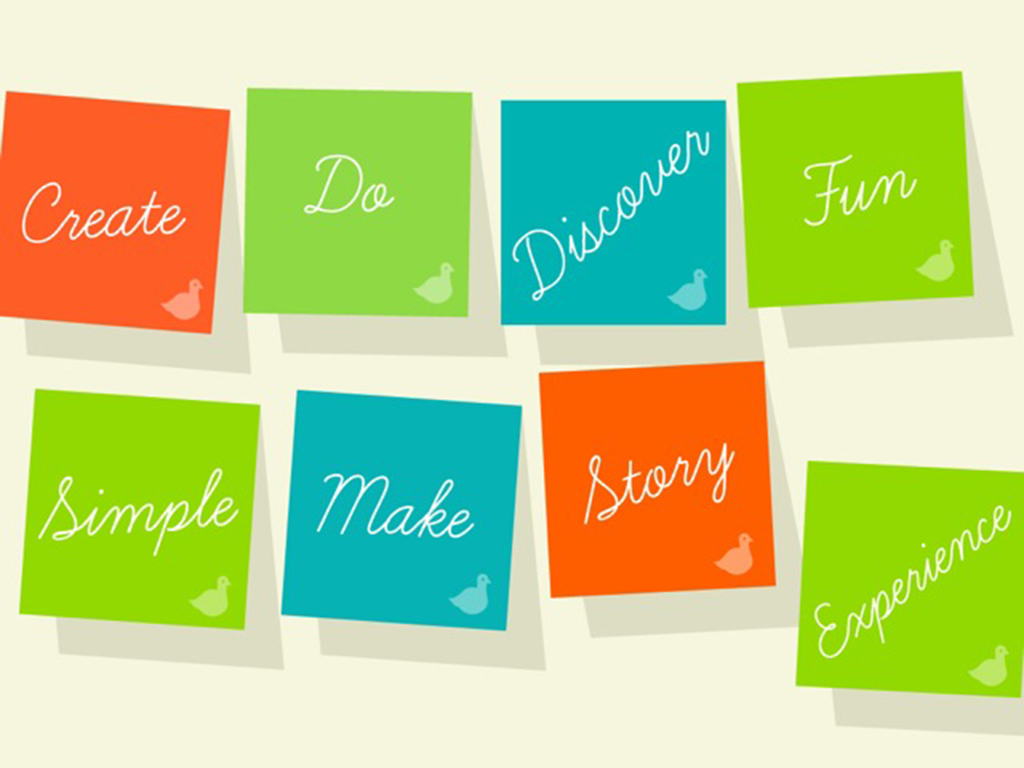We’ve all seen inspirational job and life advice in our social feeds. The one that seems to come up most often is about as vague as it gets for someone looking to take action:
“Do what you love.”
Of course, this is a wonderful ideal, and helpful inspiration for any of us choosing in what spirit we should proceed to the working world. But it’s not action-oriented, and doesn’t help anyone take that first step. So here’s what I’ve learned, hopefully some of it will be useful for you, whether you’re just trying to get started on a big school project, personal or work project, or looking for a job.
Just Do Something
I know what writers’ block feels like. As a person in a creative field (graphic design, art), I experience it too. Creativity is not necessarily an “on-demand” resource—solid and unique creative often requires some form of inspiration.
I believe it’s important to recognize that writers’ block (or artists’ block or whatever) is experienced by pretty much everyone at the start of any project. Cleaning the house or your dorm room? Where do you start? Finally beginning that Psych 101 paper? Where do you start? Hey, look your friend just posted some hilarious pics from that party last week and they’re awesome!!! Must comment! And suddenly, you are procrastinating and distracted.
We all know this feeling. The desire to start a project when you are at the beginning can be very low—unless you are already inspired and motivated to take action on some part of it.
I call it the “blank sheet of paper syndrome.” You sit down, ready to start a drawing, or ready to start writing that school paper, and all you have in front of you is a blank sheet of paper. Nothing. And starting from nothing feels like an impossible hurdle.
So, don’t start with a blank sheet of paper, start with a napkin. Start with a sticky-note, or the back of an envelope, or a chalk board, or sand on the beach, or breath on a window. Start with the smallest bite-sized piece, no matter where it fits into the larger project. Start in a way that feels imperminent, so you can crumple it away if you need to. Just DO something.
The DOING is what really matters. DOING is what makes more ideas and insights. Ideas don’t materialize; they arise from something.
Your “something” might be listing materials needed for a self-directed lab project, or maybe you start with the steps you might like to follow to execute the project. Or write your personal observations which would lead you to believe you already know the answers which the lab project is intended to solve.
To be interacting with your ideas and participating in an experience is what fuels you through the early stages of a project. The place you start is a seed, and the other parts of your project grow out from it backward and forward. DO… Something.
Make Yourself a Story
I realized a while back that when I go to a job interview and the interviewer asks me an icebreaker question, “So, what have you been up to?” I wanted to have a good answer. I couldn’t shrug my shoulders, and I couldn’t say that I’ve just been focusing really hard on school. Unfortunately, both of those answers would sound the same to a hiring manager who will meet 25-50 candidates, some of whom will have a much better answer than I.
I needed a story. YOU need a story.
Just like when you meet someone new at a party—having something to talk about makes it much easier starting to know them, or at least makes the conversation interesting.
Having a story proves that you have been DOING something, it shows you have an interest in something and have taken action on it. Or at least having a story shows you recognize significance in your experiences and are eager to learn and grow from them.
Now, your story doesn’t have to be as extreme as protecting wild elephants in Namibia, though that would be a really cool experience. Your story can be simple, like helping your accountant mom with little office tasks part-time over the summer at her workplace, so you could earn a few extra bucks.
What matters about your story is that you recognize relevance to your life and/or goals through your experience and can communicate that to others. Helping elephants in Namibia is awesome and helps you expand your worldview, make great connections, and work in a team with a shared goal. Working pat-time at your mom’s workplace introduces you to the processes of business, professional workplace and organizational skills, the discipline to start and stop a project in an adult work environment. Starting a coat drive for homeless in your community shows you have empathy and can organize people, effort and resources. Starting a blog where you review beauty products, bike parts, or foods shows your entrepreneurial spirit, and your comfort accepting that the learning process often includes failure as an important component. All these examples show initiative.
This stuff isn’t lip service, it’s your experience, and it matters. And your ability to communicate your experience and what you got out of it will not only help you be more attractive to an employer, it will help you appreciate many aspects and nuances of your daily experience in a way that keeps you positive and outgoing.
Experience matters most. Often more than formal education does in so many situations. So choose your adventure. Understand its significance before, during, and/or after. Start with bite-sized chunks to get started.
Do something. Experience it. And tell your story.

